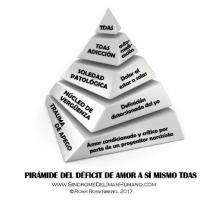Luis Carchak: «You don't have to be in the team to operate with him»
Team management is a work area as complex as it is changing; The way in which it is possible to organize, energize and supervise teams and departments is very sensitive to the social, cultural and economic transformations that are constantly happening. That is why practical experience is essential to be successful in this area.
Today we interview someone who for years has been able to understand for himself the logics that govern the team management, and that incorporates this theoretical-practical knowledge to their work with companies and coach. Is about Luis Carchak, who recently published the book "Team Coaching in Practice".
- Related article: "The 6 types of Coaching: the different coaches and their functions"
Interview with Luis Carchak, author of "Team Coaching for Practice"
Luis Carchak is Executive Coach MCC at European School of Coaching and Director of the Team Coaching Program, as well as author of the book "Team coaching in practice". Throughout this interview he talks to us about the ideas that have been embodied in this work.

How did the idea of writing “Team Coaching in Practice” come about?
Throughout my professional life, I have sought to unite action (from my beginnings in the world of physical education and sport) with research (I have a degree in Sociology) to put both fields at the service of the organizations.
In team coaching it has allowed me to integrate these two aspects, action and research, in addition to collecting the sensitivity of the Latin view of emotions and the rigor of European companies when looking at the results.
I have been able to share, on both sides of the Atlantic, learnings and strengths between the organizations and teams that I have accompanied, and train team coaches in Escuela European Coaching.
There is one more variable that explains how the book arose and that is my membership in ICF, from whose rigorous ontological framework I have made all my work, helping the expansion and institutionalization of executive coaching since its inception as part of the ICF team founded in Spain.
I try to convey the idea that "experience is not what we do, but what we learn from what we do."
What do you think is the philosophy of team coaching that you capture in the pages of this book?
It is about accompanying the teams in habitual situations so that they become cohesive and functional. I have matured the crafts to interact with the team while it continues to operate and that it can put its rules and define your north, and the leader, make decisions, define the agenda and set certain rituals of feedback and feedback.
These learnings are born from the dynamic interaction between practice and theory, having been enriching my distinctions as team coach from authors such as Segne, Lencioni, Cardon, Nardone, Robertston, Shelman, Hamel, Espinal, Rosenberg, Taleb, Leloux ...
As a coach, what are the main learnings that experience has given you in the field of team coaching, and that you think you would not have internalized if you had limited yourself to studying the theory?
My intention has been to show an alternative, a concrete process so that teams can find agile answers and achieve results, avoiding getting bogged down in old, unproductive beliefs; offer a proposal to limit the suffering of dysfunctional conversations. For me, craftsmanship is about conversations happening, flowing, and complete without the emotional tears that are so common in organizations.
I have tried to reflect a framework of distinctions to broaden the view on the equipment as a complex system. I also hope to suggest how to structure a team accompaniment process and, of course, with what crafts to do it.
What are the main myths about team management that you think your book helps to overcome?
The first myth is that you have to be on the team to operate with it. The team coach is out of the system most of the time observing the system. Of course, a system just by being watched is changing and trying to show the best version of itself. Team coaching provides a minimum of interaction and demystifies the myth of the intervention, where the one who intervenes attributes a power and a capacity to decide on the one who does not have that can.
Among the moments in which the coach does work and interact within the team, the ritual that the team coach generates so that in the last minutes of the accompanying meetings, a conversation about how the team has talked is moderated, a space where the interaction of the The coach is at the service of the team reflecting on how to converge their productive forms of action and discard those that resulted unproductive.
In team coaching, the team always has absolute sovereignty over its work, one hundred percent decision-making power. The team coach breaks the myth of guiding and opens the way to accompany.
And the great myth that team coaching destroys is that the most absurd thing in teams is to play to be right. In complex and multidisciplinary teams, the great challenge is to play to agree, not to be right. But then, all the practice of the one who accompanies the team to understand this distinction, this new way of relating to produce new results. From diversity, he will be the first to renounce being right, the team coach is vulnerable and works from questions and not from answers.
Knowledge speaks, wisdom listens. The different forms of interaction of the social sciences with the teams have been based on knowledge. Team coaching works from the question, from the long road to wisdom.
Over the more than two decades that you have been working as a team coach, how have work dynamics in companies changed?
Our environment is changing rapidly, driven above all by digital technologies and globalization, which make what worked in companies until now no longer makes sense and has stopped be effective. And leadership is a substantial part of that process. We have seen an evolution towards smarter teams and smarter leadership.
Currently we talk a lot about "agile" methodologies that work so that the north-oriented system is the one that pulls. In other words, with a minimum of management structure, the organization ensures that commitment is what gives it traction.
As for leadership, we no longer think of the leader as an isolated individual, he is part of the system, he is a function, and that is to be at the service of the team, the system, achieving its purposes. The leader points out the what and gives away the how, and strives to make things happen, even if he never has all the budgets he needs or all the people he wants. Ultimately, the leader generates the emotional context for things to happen. The team coach accompanies in this work.
What type of readers is the book intended for?
Although the book is called "Team Coaching in Practice" and is designed to provide new tools, distinctions and methodologies to team coaches, with this same methodology from Escuela Europea de Coaching we train leaders for their best work within teams and, of course, it is the way we train teams to be cohesive, efficient and assertive.
Therefore, if you are a team member, if you are a team leader or supervise teams, and also if you are a team coach, it will help you. And if you are an executive coach who wants to start testing the virtues and results of team coaching, it will undoubtedly serve you. to change the way of observing, because you will stop observing by focusing on people to focus on the team as system.
"Team coaching in practice" is the way we train to sustain in teams the capital of connection, empathy and trust they need to produce results.


